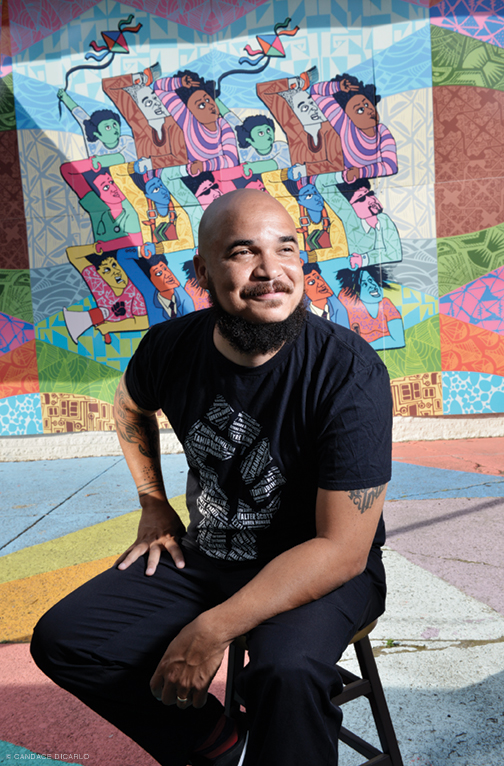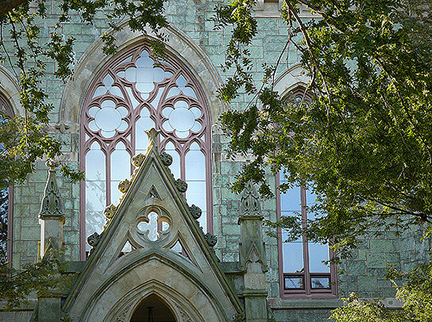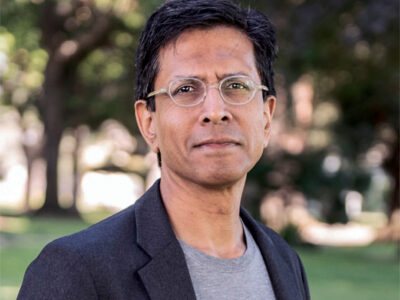
Chaplain Chaz Howard has been tasked with running a new office on social equity and community.
Charles “Chaz” Howard C’00 was already wrestling with imposter syndrome when he first arrived on Penn’s campus in the fall of 1996. So he was shocked and crushed when his freshman advisor looked at him during their first meeting and said, “Another Black student from Baltimore—you’ll probably fail out too.”
“I like to think, at best, he was trying to use some reverse psychology to motivate me to run harder,” Howard says. “But that’s not what an 18-year-old who was already insecure about being here needed to hear.”
Howard quickly found a new advisor but still “took a series of L’s” as a freshman. His athletic career as a triple jumper on the Penn track team was short-lived. He lost a student government race and didn’t make an a cappella group. His high school sweetheart dumped him. “Being a freshman’s hard enough,” he says. “Being a first-year student facing social inequities makes it even harder.”
Trying to push aside his insecurities, Howard soon made it into several prominent groups (including the a cappella group The Inspiration, which he sang in for four years)—though in the course of becoming a campus leader, he overextended himself to the point that he drank too much and was briefly kicked out of school for bad grades. After giving up drinking and graduating Penn on time, he felt a calling to ministry. This led him back to his alma mater as the University chaplain, where for the past 12 years he’s been ministering hope and love to students also struggling to find their place on campus and in the world [“The Idea of Love,” May|Jun 2018].
Now, he has another important role. In late June, President Amy Gutmann and Provost Wendell Pritchett Gr’97 announced the appointment of Howard as Penn’s first-ever vice president for social equity and community, beginning August 1.
“Chaz has made it his life’s mission to bring together diverse groups of people,” Gutmann said in the announcement. “Where some see division, Chaz sees common ground; where some see despair, he sees hope; where some see hate, he sees love.”
Howard’s appointment came on the heels of the nationwide racial justice protests sparked by the police killings of George Floyd and other Black Americans. Howard had attended some of the demonstrations in Philadelphia, leaving each one encouraged by the “amazingly diverse” group of protesters he saw. “I was feeling very low. Very, very angry. Very sad,” he admits. “And then, I think, some of the activism and some of the changes from people on the streets really has brought me a lot of hope.”
It was around this time that Gutmann asked to speak to Howard, who did not expect to be offered the opportunity to lead a new office on diversity and inclusion. It was important to him that he stay on as chaplain—which he will, while passing off some day-to-day duties to senior associate chaplain Steve Kocher LPS’13—and thinking about managing such an expanded portfolio was daunting. But, he says, “I think my heart was quickly like, I love Penn—anything I can do to serve Penn, it’s a yes.”
In his new role, Howard will design and oversee the University’s recently announced Projects for Progress, a fund intended to encourage students, faculty, and staff to implement research-based pilot projects designed to advance Penn’s aim of becoming a more inclusive university and community. He will also work with other administrators to expand the five-year-old Campaign for Community, which offers funding and sponsorship for small-group events related to social issues.
“We’re a space of ideas,” Howard says. “If we put the right resources, encouragement and affirmation behind some of the ideas, we might be able to move the needle a little bit.”
Howard’s first order of business will be hiring three people to work under him and finding a physical space on campus, before building a website, launching an online magazine, and developing a University-wide speaker series. Over the course of the 2020–21 school year, he hopes to examine “the big issues on campus right now,” starting with public safety and policing. He also wants to “wrestle with hard questions from our past,” including how the “Black Bottom” neighborhood in West Philadelphia was razed in the 1960s to make way for the expansion of University City.
Howard has been thinking about difficult issues since his days as an undergraduate. During his freshman year, he remembers seeing a large Confederate flag hanging out of a window in the Quad. And there were bomb threats that forced him to evacuate W. E. B. Du Bois College House, where he lived for three years and says is a place that “still feels like home” when he visits. “It helped me discern what it meant to be a young Black man in America,” he says.
Howard has heard the claims throughout the years that a college house created for Black students is self-segregating, “but the reality is those Black students clearly leave the building,” he says. “And white students certainly are allowed in the building. … It’s important to have affirming spaces on a campus if you feel like the rest of campus isn’t particularly affirming.”
Howard does believe the campus has made big strides in becoming more affirming for Black students and other minorities in the 20 years since he graduated. He points to a more diverse upper leadership group, including Pritchett and others in the Provost’s office, the Penn Trustees, and some of the University deans, including Erika James, who began in July as Wharton’s first Black and female dean. “She’s sharp, really smart, and thoughtful,” Howard says. “And she’s right on time.”
Among the other “real measurables” he’s seen on the road to a more just campus are the rise of cultural centers—including the Black cultural center Makuu, which celebrates 20 years on campus this year—and Africana Studies becoming a department. “Retention rates are significantly better for Black students,” Howard says, before adding that the number of Native students is “still amazingly low” and that “there’s still a whole lot of growth left.”
He’s ready to keep pushing for more growth, at a place he loves enough to want to always make better.
“I think Penn, like America, is trending in the right direction,” Howard says. “I’m hopeful. I really think things are changing.” —DZ




